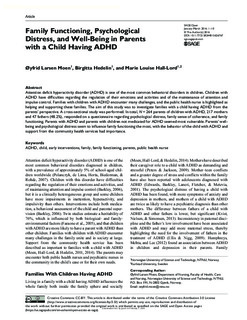| dc.description.abstract | Attention deficit hyperactivity disorder (ADHD) is one of the most common behavioral disorders in children. Children with ADHD have difficulties regarding the regulation of their emotions and activities and of the maintenance of attention and impulse control. Families with children with ADHD encounter many challenges, and the public health nurse is highlighted as helping and supporting these families. The aim of this study was to investigate families with a child having ADHD from the parents’ perspective. A cross-sectional study was performed. In total, N = 264 parents of children with ADHD, 217 mothers and 47 fathers (48.2%), responded on a questionnaire regarding psychological distress, family sense of coherence, and family functioning. Parents with ADHD and parents with children not medicated for ADHD seemed most vulnerable. Parents’ well-being and psychological distress seem to influence family functioning the most, with the behavior of the child with ADHD and support from the community health services had importance. Attention deficit hyperactivity disorder (ADHD) is one of the most common behavioral disorders diagnosed in children, with a prevalence of approximately 5% of school-aged children worldwide (Polanczyk, de Lima, Horta, Biederman, & Rohde, 2007). Children with this disorder have difficulties regarding the regulation of their emotions and activities, and of maintaining attention and impulse control (Barkley, 2006), but it is a clinically heterogeneous group and some children have more impairments in inattention, hyperactivity, and impulsivity than others. Interventions include both medication, a behavioral assessment of the child and parental supervision (Barkley, 2006). Twin studies estimate a heritability of 76%, which is influenced by both biological- and family-environmental factors (Faraone et al., 2005), and that children with ADHD are more likely to have a parent with ADHD than other children. Families with children with ADHD encounter many challenges in the family unite and in society at large. Support from the community health service has been described as important to families with a child with ADHD (Moen, Hall-Lord, & Hedelin, 2011, 2014). The parents may encounter both public health nurses and psychiatric nurses in the community in the child’s case or for their own needs. | nb_NO |

